#Seinfeld agere
Explore tagged Tumblr posts
Text
Elaine Benes from Seinfeld

Is a mother caregiver!
#Seinfeld#Seinfeld agere#ur fav is agere#age regression#fandom agere#sfw#agere#sfw caregiver#sfw only#mother caregiver
9 notes
·
View notes
Text

♡ neo-negative-generation hub ♡
: ̗̀➛ hai my name is neo/viktor/maksim im a transmasc 2spirit 18 yr old and i use he/him pronouns. im a native american-american and i speak english + russian. irl im a vintage punk and a commie fag.
IMPORTANT TAGS: #video, #audio, #save for later, #cat tag, #warner core, #major grom, #arcane, #portal, #fallout, hackers 1995 (#hackers), #seinfeld, #matthew lillard, #9/11, #bullet train, #the man from uncle, house md (#house), #blade, #james acaster
please block these if they make you uncomfortable! also just ask for things to be tagged :3
DNI: zionists, terfs / radfems, bigots, exclusionists, anti he/him lesbians, anti-agere, anti-selfshipping, anti-kink, capitalists, racist assholes, pro-ana, pro-loli / map individuals, generally ppl who suck, anti-hetalia, hazbin hotel/vivziepop fans, anti-ai, ppl who arent gonna respect boundaries lol




BLOGS: i have many sideblogs. here they are.
🛍️ @communist-splatoon - politics, splatoon
🔮@woodsboro-generation - horror movies
📽️ @neonational - anime and cute stuff
🖊️ @sl1-incident - misc aesthetic
🍭 @neo-imperial - star wars
🧜♀️ @trans-edward-nashton - batman
🎡 @marshmallowghostmen - ghostbusters
🦠 @bloodyselfshipping - selfshipping
🎉 @generational-atrophy - fanfic / writing
🪼 @killshot-mantell - star wars ocs
☔ @xxxbugaboo1990xxx - 90s ocs
👽 @never-made-it-to-his-20s - au ocs
🍇 @neogenic-artum - art blog















2 notes
·
View notes
Photo
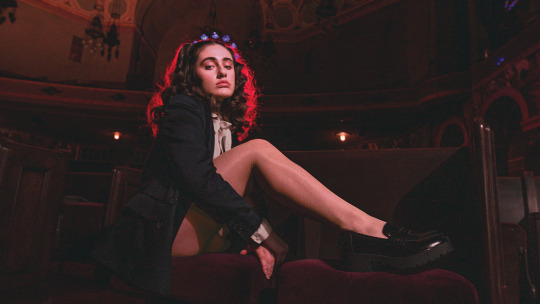
Chaotic Bisexual.
Shiva Baby writer-director Emma Seligman tells Ella Kemp about expanding her wildly cringey short film into an even more anxiety-inducing feature, why Virgo and Taurus make the perfect producing pair, and the eternal conflict of being a good Jewish girl.
“If I can skip a bris to see E.T., I like movies!” —Emma Seligman
It sounds like a strange riff on a guy-walks-into-a-bar joke: a girl walks into a shiva and bumps into her secret ex-girlfriend, then her sugar daddy, then his shiksa wife, oh, and their baby—yet the payoff is so much more rewarding.
Filmmaker Emma Seligman’s debut feature is a new kind of teen classic: 78 non-stop minutes teeming with well-drawn traits and tropes that define the best coming-of-agers, the best Jewish comedies and the best day-in-a-life psychological roller-coasters.
Shiva Baby began as a grad project—a short film of the same name—and Seligman’s feature-length embellishment impressed at last year’s virtual editions of SXSW and TIFF, where it was quickly snapped up for international distribution. In a way, Shiva Baby was perfectly tailored to the times we were living in: Danielle, our reluctant heroine, is trapped in a claustrophobic family event she can’t escape, as people from her past and lies about her future make their way deep under her skin.
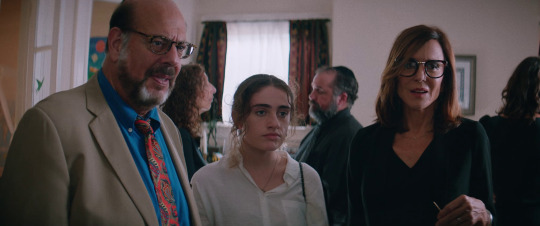
Fred Melamed, Rachel Sennott and Polly Draper in ‘Shiva Baby’.
Shiva Baby is very much the product of a wry school of emerging filmmakers who understand excruciatingly mundane horror and pin-sharp comedy as intimate bedfellows. Seligman’s writing finds a way to flesh out gloriously caricatural Jewish relatives, probing and overbearing and irrational. She does this both through dialogue and a visceral, haptic aesthetic that lurches in and out of focus visually, and has a nails-on-chalkboard unease sonically.
Coming in hot with a 4.01 average rating, Shiva Baby is striking all sorts of discordant notes with film lovers. “Combines some of my biggest anxieties: being asked if I have a boyfriend as well as what my plans for the future are and people talking with their mouths full,” writes Muriel.
The film’s “bisexual chaos”, which hinges on a haywire performance from Rachel Sennott as Danielle, opposite Molly Gordon’s overachieving ex-girlfriend, Maya, is also one of its great strengths. Glee star Dianna Agron is the shiksa threat, Kim, while Danny Deferrari is Danielle’s hapless benefactor, Max. If that’s not enough? Polly Draper, Fred Melamed and Jackie Hoffman are also just there.
What do you think defines a Jewish sense of humor? Emma Seligman: It’s morbid usually, and darker—generally uncomfortable and cringeworthy. I think about Curb Your Enthusiasm or Seinfeld, and A Serious Man. It borders on, “Is this funny at all?” I think Jewish humor leans into the darkly funny British sense of humor. I’m Canadian, so I feel like I’m halfway between the UK and the US in terms of their sense of humor.
Was it always your intention to make a comedy that feels like a bit of a nightmare? You’ve mentioned Black Swan and Opening Night as touchstones… Because I came from a short film, the question when expanding into a feature was, “How are we going to keep everyone interested in this day?” It’s got to be a significant day, it’s got to be that this young woman’s life has completely changed from this day. So what is it that changes? Why are we watching it? I watched a lot of movies that took place in one day, one of them was Trey Edward Shults’ first film Krisha. And then from there I realized that anxiety and this scary psychological feeling is a great way to have the audience stay there.
I watched Opening Night because there’s a shiva in it, but it was more the lobby scenes that were so claustrophobic and tense. And then each step of the way with each department, we were like, okay, it’s gonna be tense, but then we got to music, I was like, okay, this has become a full nightmare. Initially, I was just like, it’s got to be tense, but by the end, I was like, well, it does feel like a nightmare to a young woman sometimes.
Because you mention that, I have to ask whether you’ve seen Bo Burnham’s Eighth Grade? I have, it’s incredible. It’s so funny, they’re both coming-of-age [films], and one of them is about a fourteen year old and then the same sort of feeling exists when you’re 22. When you’re fourteen is when it begins, and when you’re 22 you’re sort of at the end of it and you’re like, “Oh, I thought I figured out what I was supposed to do when I started feeling insecure this way at fourteen about sex and boys.”
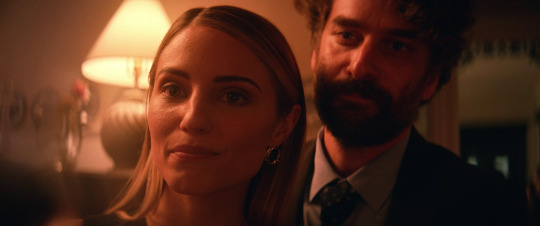
Diana Agron and Danny Deferrari in ‘Shiva Baby’.
Let’s talk about Rachel Sennott, who you have describe as your “Virgo rock”. What do you bring one another in your creative partnership? She’s a hustler, and she sets goals like nobody else. I think she moves very fast, and I’m more detail-oriented. I don’t know if the movie would have happened without her because she was like, “What are the goals to achieve this film?” After we made the short film, she just kept checking in with me. She goes well beyond what an actor does, which is why she’s an executive producer, because she was very, very invested in seeing the movie get made.
I think she pushes. We joke that she brings me out of my depression and I help calm her down. I feel like Taurus is a little more chill. Virgos are also earth signs, but they run on a faster frequency. So I think I calm her down, especially when we’re writing and bringing it back to structure. But she’s way funnier, she’s able to give jokes so quickly. We balance each other perfectly, for sure.
Do you think your partnership with Rachel is the kind of partnership you could see yourself maintaining throughout your career? Definitely. I think it’s important to have a good friend and also a young woman. She’s got different career goals from me, but they’re aligned. And we’re not in competition with each other. I feel so grateful because so much of the time I feel like the world does make you feel like you’re in competition with your friends that are trying to do the same thing as you when you’re a young woman—or just maybe in general.
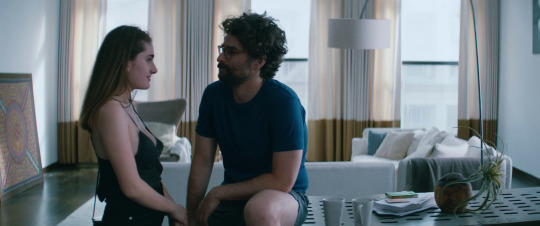
Rachel Sennott and Danny Deferrari in ‘Shiva Baby’.
Her character in Shiva Baby completely subverts the idea of a “nice Jewish boy/girl” which can be a trope in movies, but also very much a real thing in life. Is that something you consciously wanted to subvert, or did it come organically from the story you wanted to tell? I wanted to contrast that idea of a “nice Jewish girl” because every nice Jewish girl or boy has a sex life. I felt the sort of nice Jewish girl stressors on me were completely opposite from the NYU art school sugaring worlds, and hookup culture broadly. My family is such a huge part of my life and I think that those two sets of pressures are completely contradictory; to be a good girl or boy and have a stable career ahead of you, and to be finding, even if it’s at the very beginning, your eventual partner, or to just be in a relationship. And I felt like in school, no one wanted to date, everyone was hooking up. So many of my friends are sugar babies. I tried it super, super briefly.
I felt like the world was telling me to be like “an empowered, independent, sexy woman who doesn’t care what anyone thinks of her, and doesn’t abide by any rules”, and I was like, “This is the opposite of being a nice Jewish girl!” And I just felt like those two things were screaming at me. So I did want to play on that. But I don’t even think it’s playing, just because that felt like what I was trying to battle within myself. And I think a lot of young people do, whether they’re Jewish or not. That’s their family’s expectations. And then the world is like, “But don’t care and don’t commit…”
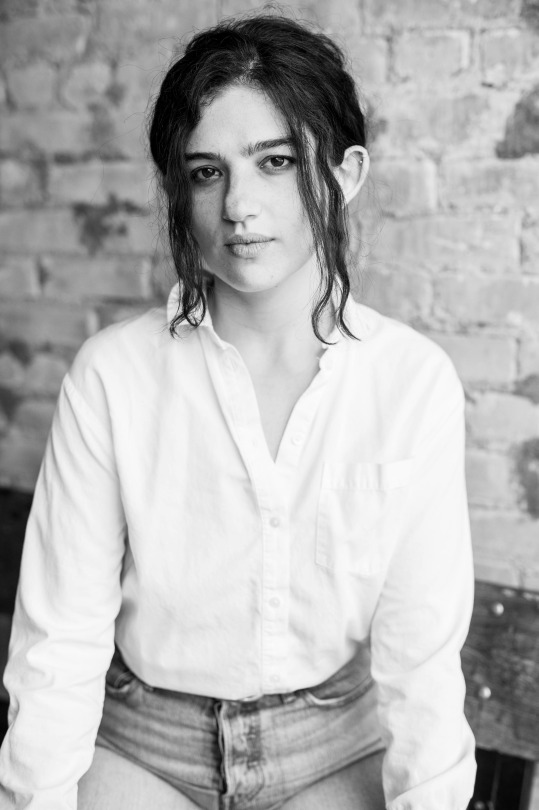
Writer-director Emma Seligman. / Photo by Emma McIntyre
But then you still have to go home to your parents at the end of the day and they’re going to tell you what to do… Exactly.
What would you want viewers to take away from Shiva Baby about the sugaring community that you feel has been maligned in the past? I’m not a sex worker, so I don’t want to speak on behalf of this community, but I definitely feel like there hasn’t been many positive portrayals of sex workers. So I just wanted to show someone—because I knew so many friends of mine who did it—who enjoyed it, or purposefully did it and didn’t feel bad or shameful about it. I think maybe a lot of people think that it’s always something that comes out of dire circumstances. But whether that is the case or not, I think there’s a lot of people who enjoy it and enjoy what they do like any other job. So I just hope that they’re able to sort of widen their scope of what a sex worker looks like and acts like. Every sex worker has got a family, friends, a full robust life, as we all do.
It’s time for your Life in Film questionnaire. Can you give me a few must-watch Jewish films for people who don’t know where to start? Fiddler on the Roof, Yentl, Keeping the Faith, Kissing Jessica Stein, A Serious Man. Definitely Uncut Gems, and Crossing Delancey.
Shiva Baby has been described on Letterboxd, variously, as “Uncut Gems but make it chaotic bisexual”, “the most stressful Jewish movie since Uncut Gems”, “the chaotic successor of Uncut Gems”, “if Krisha and Uncut Gems had a baby”, and, of course, “Uncut Gems for hot Jewish sluts”… Amazing, I love that. Extremely nice comparison.
Who is your favorite promising young woman? Not Emerald Fennell’s film, but a young creative or performer who you think is making waves. I love Hari Nef—I think she’s amazing and am really excited to see what she does next. I loved her so much in Transparent and Assassination Nation, and I don’t understand why she hasn’t been the lead in a million movies.

Molly Gordon with Rachel Sennott in ‘Shiva Baby’.
What should people watch next after Shiva Baby? Those Jewish movies would be a great start. And then Krisha, although I think a lot of people have seen it especially if they’re on Letterboxd! But then those Jewish romantic comedies, and then Obvious Child, all those movies are very sweet and endearing and helped me make it.
Separate from film, if it’s shiva-related then Transparent. If I didn’t have Transparent I don’t think I would have seen world of grounded, nuanced Jews that I could do comedy with. It would have been more in the Curb vein, which is also amazing, but a little more schtick.
What was the first film that made you want to be a filmmaker? My parents are huge movie buffs so I’m not sure there was one moment, but I will say that when I was six there was a re-release of the 20-year anniversary of E.T. the Extra-Terrestrial and I was at a horribly packed bris and my uncle was like, “Fuck this, there are so many people here, I can’t even breathe. Let’s go see E.T.” That was the first moment where I was like, if I can skip a bris to see E.T., I like movies.
Related content
From Short to Feature: Rob’s list of 2020 films that made the jump
Jewish Cinema (non-Holocaust): Amelia’s list of films “for when u want to celebrate your heritage but don’t want to have to think all too deeply about the Shoah”
Best Directorial Debuts of 2020: suggested by Letterboxd members, featuring Shiva Baby
Follow Ella on Letterboxd
Shiva Baby is now in select theaters and on VOD in the US. Film stills by Maria Rusche.
#shiva baby#emma seligman#jewish filmmaker#jewish director#directed by women#rachel sennott#jewish film#jewish movie#transparent#uncut gems#hari nef#e.t. the extra terrestrial#obvious child#krisha#trey edward shults
89 notes
·
View notes
Text
At Lunch With Joyce Randolph & Audrey Meadows
AT LUNCH WITH: Joyce Randolph and Audrey Meadows; Trixie and Alice, on Their Own By BRYAN MILLER Published: October 13, 1993
SOMETIMES an actress becomes so identified with one role in her career that the character clings to her as stubbornly as puppy hair to a navy blazer, impossible to brush off.
"For years after that role, directors would say: 'No, we can't use her. She's too well known as Trixie,' " said Joyce Randolph, who was immortalized as the wife of Ed Norton, the rubber-limbed sewer worker in the 1950's television sitcom "The Honeymooners."
A similar fate befell Audrey Meadows, who played the wisecracking wife of a blustering bus driver named Ralph Kramden, portrayed by Jackie Gleason. "After the series, I was lucky to do guest shots with Dinah Shore and Red Skelton, but almost all of the stuff I was offered was something in the kitchen, always in the damn kitchen," Miss Meadows recalled over lunch recently at Le Cirque in Manhattan.
For both women, still close and affectionate, their famous television personae hover above them like giant balloon characters at a Macy's parade, attracting throngs of nostalgic admirers and prompting dozens of letters a week.
Since "The Honeymooners," Miss Randolph's acting career has been limited to commercials and occasional musical summer stock. She lives in Manhattan with her husband, Richard L. Charles, a retired advertising executive. Miss Meadows, who lives in Beverly Hills, Calif., and has been divorced once and widowed once, has made many guest appearances on television shows and was in two subsequent sitcoms, "Too Close for Comfort" and "Uncle Buck." She has recently completed a book about "The Honeymooners" titled "Love, Alice," which is to be published by Crown next year.
Entering the restaurant wearing a shimmering pink-and-white Chanel suit and oversize tinted glasses, Miss Meadows was hardly recognizable as the tough-as-steel-wool spouse who fended off many threatened flights to the moon, courtesy of Ralph. Her once crystalline voice has taken on a cigarette-induced gruffness, but her distinctive inflection, familiar to all "Honeymooners" addicts, remains.
Miss Meadows began her career in musical comedies. The daughter of a missionary, she lived in China until age 5, when her family moved to California so that the children could be educated in the United States. "I first got into musical comedy as a teen-ager as the result of singing in church," she explained. She eventually joined road tours of shows like "High Button Shoes."
Miss Randolph had a similar theatrical background. After performing in local theater in her hometown of Detroit, she made the mythical trek to New York City in search of fame. In 1945, after several years of touring and appearing in Broadway shows, she found herself in Schenectady, N.Y., where the General Electric Company had some of its early television production studios.
"Mostly I remember the lights, which were so harsh, and that terrible black lipstick," she said, rubbing her lips as if trying to remove it.
The first television sketches were largely reworks of popular radio mysteries. "For a while I was publicized as the most murdered girl on television," Miss Randolph said, laughing.
Acting jobs were easier to find then than they are today. "We all were in the same kinds of bars and restaurants -- Sardi's, Lindy's, the Blue Angel," Miss Meadows recalled.
Miss Randolph found her way to the DuMont television network, where she was asked to do a Clorets commercial. She was such a hit that CBS asked her to do the same commercial on "Cavalcade of Stars," a variety show whose host was Mr. Gleason, a former nightclub comic who was a rising star.
It was on this show that Mr. Gleason began developing characters like Reginald Van Gleason 3d, Rudy the Repairman and Ralph Kramden. "Cavalcade of Stars" opened in 1950 and ran for two seasons, followed by two years of "The Jackie Gleason Show" and then, in 1955, "The Honeymooners."
Mr. Gleason liked the young "Clorets girl." So when he began casting "The Honeymooners" he offered the part of Trixie to Miss Randolph. For his stage wife, named Alice, he chose a seasoned actress named Pert Kelton. The part of the sewer worker went to Art Carney.
Miss Meadows, who eventually replaced Miss Kelton as Alice, was a pioneer in the early days of television, too, in both Chicago and New York City, doing bit parts in skits on variety shows as well as commercials. Her mellifluous voice won her a job in the comedic sketches of the radio duo Bob and Ray. While working on radio, she was asked to take a leading part in the Broadway musical "Top Banana," starring Phil Silvers.
On Broadway she became acquainted with Mr. Gleason's manager, Bullets Durgom. "He actually looked like a bullet -- bald, short, roundish," she said.
By this time, Mr. Gleason had moved his variety show, which included a "Honeymooners" sketch, to CBS. Just two weeks before the first show, he had to find a new actress to portray Alice because Miss Kelton had fallen ill.
Mr. Gleason supposedly rejected Miss Meadows for being "too young and too pretty." As Miss Meadows relates the story, she went home that evening, put on a frumpy housedress, changed her hair and had a photographer take pictures. Mr. Gleason saw the photos and hired her on the spot, not knowing he had rejected her the day before.
Did the two young actresses have any idea they were about to make television history?
"Heavens, no," Miss Randolph said, placing an open hand on her cheek, a la Trixie Norton. "Everything was so casual in those days, you never thought it would be important." In fact, Miss Meadows was the only one of the supporting cast who drew up a contract calling for residuals.
"The Honeymooners" achieved immortality with the 1955-56 television season, when 39 episodes were filmed at the Adelphi Theater on West 54th Street in Manhattan. The cast performed twice a week, Tuesday and Friday nights, before an audience of about 1,000.
Mr. Gleason loved spontaneity; hence, there was little or no rehearsal. Often the cast received the script the night before performing; it was not unusual for them to try on their costumes just before going on the air.
"I remember some nights when we had guests on the show, and I saw some of them vomiting in the wings from nervousness," Miss Randolph added.
Both actresses recalled one memorable fiasco on stage, during an episode called "Better Living Through TV," in which Ralph buys a warehouse full of fancy can openers and tries to sell them fast by appearing in a television commercial with Norton.
"The two of them are making the commercial, and the can opener is supposed to come down on Jackie's hand so he can do his pain bit," Miss Meadows recalled. "Then he starts running around the room, and he hits a prop wall that isn't fixed securely. He knocks down the wall and lands on his face. Then, Artie goes to help him and Artie lands on his face. That scene, just as it happened, was left in and is still being shown today."
Neither woman has anything nice to say about the most recent biography of Mr. Gleason, "The Great One," by William Henry 3d (Doubleday), which portrays Mr. Gleason as a moody, booze-soaked egomaniac who bullied his writers and abandoned his family.
While both contend that the book presents a flawed portrait, Miss Randolph concedes that Mr. Gleason sometimes mistreated his staff. "He was very mean to the writers," she said. "He kept them isolated. He didn't get to know them."
Miss Meadows, to this day Mr. Gleason's greatest defender, attacked Mr. Henry's emphasis on Mr. Gleason's drinking. "Jackie did not drink on the show, ever, not one sip," she asserted.
About the book's accusation that Mr. Gleason tried to thwart the richly talented Art Carney, both women strongly disagree.
"Never, never," Miss Meadows said. "There were times when he would say in rehearsal: 'Give that line to Artie. It would be funnier coming from him." Added Miss Randolph: "Art didn't want to be top banana. He was always so low-key and shy."
When Mr. Gleason was once asked why "The Honeymooners" was so popular nearly 40 years later, he replied, "It's funny." Miss Meadows concurred. "We had such good writing," she said. "The money people running the industry today don't know good scripts."
Moreover, "The Honeymooners" was a mini-morality play, in which the characters always learned lessons about things like greed, vanity, trust, love and the importance of sharing.
"You know what I thought was interesting about 'The Honeymooners'?" Miss Meadows said. "There we were, blowing whatever money we had from his driving a bus. The Nortons lived a little better than we did because they put everything on credit. We were both lower middle-class people, but we had class. 'Roseanne,' even though it's funny, do you think they have class?"
Both women think "Murphy Brown," "Seinfeld" and "Mad About You" are also funny.
After lunch, Miss Meadows and Miss Randolph did what their fictional counterparts never would have done: they shopped on Madison Avenue, taking time out to explore the new Barneys. They were spotted by an adoring sales clerk at the Estee Lauder counter and soon attracted a large crowd of autograph seekers -- so many that Estee Lauder herself came to see what the fuss was all about. "You see," Miss Randolph declared. "It can happen anywhere."
Copywritten NY TIMES
2 notes
·
View notes
Text
Jerry Seinfeld from Seinfeld

Is a toddler regressor!
#Seinfeld#Seinfeld agere#ur fav is agere#age regression#fandom agere#sfw#agere#age regressor#sfw only#toddler regressor
6 notes
·
View notes